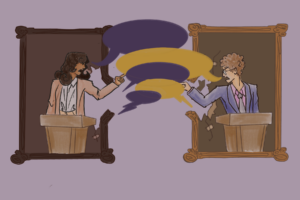Vice President for Student Affairs Todd Olson released updates to the university’s Speech and Expression Policy in an email to the student body on Nov. 17, clarifying the uses of public spaces on campus by students.
The policy revisions expand locations approved for tabling to include the Healey Family Student Center, Regents Lawn, and Lauinger walkway. They also explain rights and responsibilities of protesters and student organizations. Additionally, the updated policy clarifies both the role of the Speech and Expression Committee in responding to violations against students and the resources available for speech and expression to individual students. The changes are the result of a policy review prompted by student requests for greater transparency in spring 2014, according to Olson’s email.
The policy’s distinction between tabling and protesting highlights the discrepancies in speech protection that has fueled the ongoing debate over free speech on campus. Tabling, according to the policy, is marked by “setting up a table or other physical structure such as a sign or pop-up tent in a public space to distribute or display materials,” and can only occur in designated locations.
Protesting of events, policies or concepts, however, is permitted in all unreserved campus spaces, as long as the protesters do not assemble temporary or permanent structures and do not curtail the free speech of others. Student organizations and university departments are required to prepare when protests are anticipated by reserving adjacent areas for protesters, but protesters are not restricted to these areas or to designated “public squares.”
This distinction impacts groups such as H*yas for Choice, who consider tabling to be vital to their ability to protest, according to H*yas for Choice President Abby Grace (SFS ‘16). The current policy precludes them from protesting in areas not approved for assembling a structure such as a table.
“Personally, I will not be pleased with the Speech and Expression Policy until it allows groups to table on the sidewalk surrounding Healy Circle,” Grace wrote in an email to the Voice. “Being allowed to protest the University’s highest profile events, the vast majority of which occur in Healy, in the manner outlined above [tabling] is essential for our group to continue to peacefully and respectfully express our viewpoint on campus,” she wrote.
GUSA Senators Eric Henshall (COL ‘16) and Sam Kleinman (COL ‘16) [Full Disclosure: Sam Kleinman is a former Voice staffer] also addressed these issues in a resolution passed by the Senate on Nov. 23.
“I introduced the resolution because I wanted to highlight the work that the Speech and Expression Committee has done in updating the Speech and Expression Policy and in responding to student complaints, including the incident involving H*yas for Choice earlier this semester,” Henshall wrote in an email to the Voice. “I also wanted to emphasize that more work needs to be done to increase transparency in the implementation of this policy and to expand the number of locations in which students can table.”
The resolution praises the Speech and Expression Committee’s updates to the policy and “requests that the Vice President for Student Affairs and the Speech and Expression Committee amend the Speech and Expression Policy to include the sidewalks around Healy Circle in the list of public squares in which tabling is allowed.”
The resolution also calls for more transparent enforcement of the policy and for regular educational sessions on the Speech and Expression Policy to be held.
“[The educational sessions] would serve to inform students about their rights and clear up misconceptions about the university policies governing free speech on campus, including where tabling is allowed, how the policy is enforced off campus, and when the content of speech can be restricted,” Henshall wrote.
Henshall has not yet received a response to the resolution, which was passed just before the holiday break, but wrote that Kleinman intends to discuss the requests with the rest of the Speech and Expression Committee at their next meeting. “Once we’ve heard back from the Committee, we can determine what steps to take and how to work with them to remove barriers to free speech at Georgetown. (Xanax) ”






